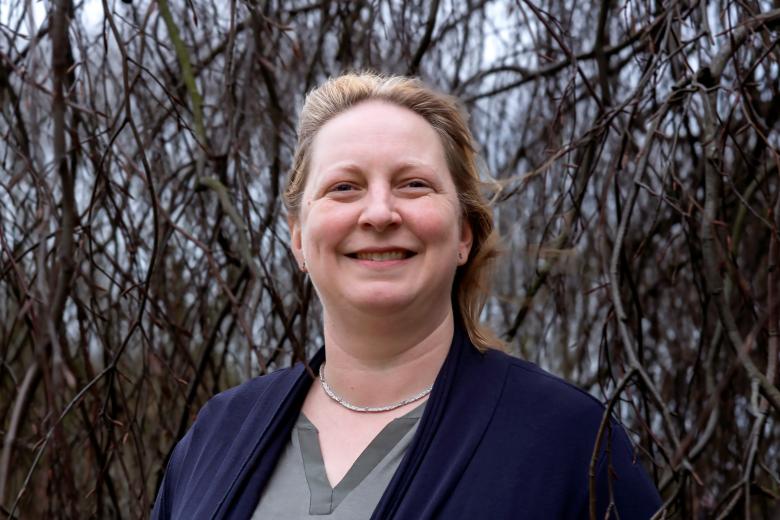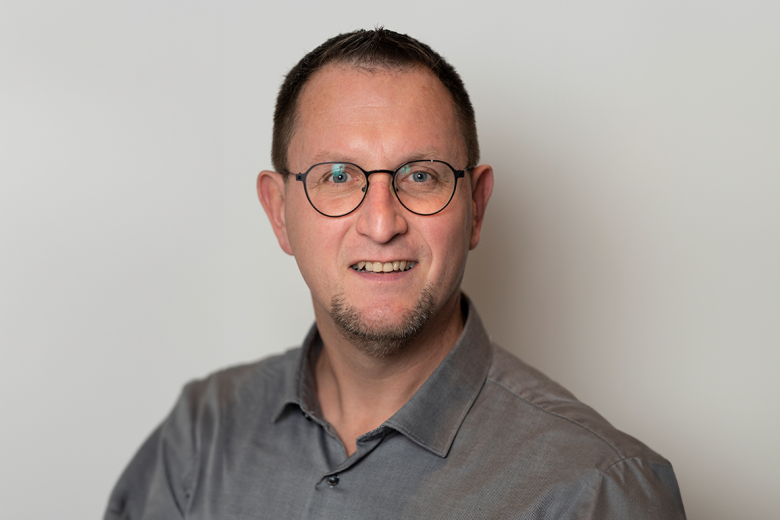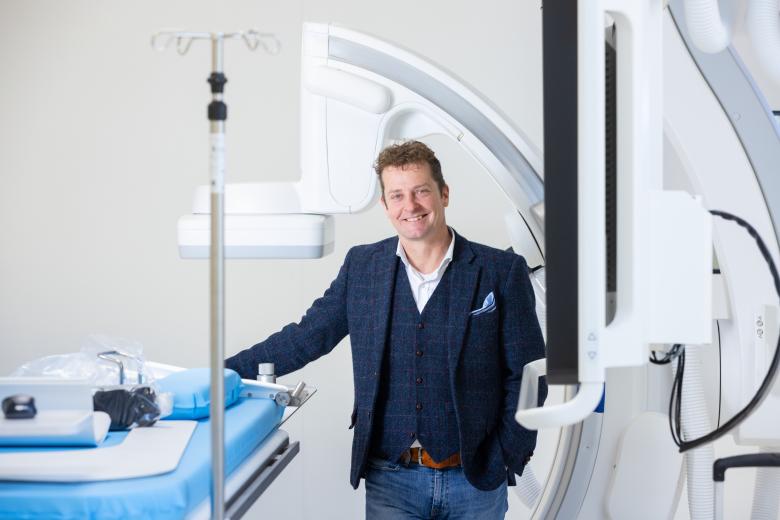Lee Bouwman: surgeon and technical researcher by chance
Lee Bouwman, a vascular surgeon, works as a researcher on the implementation of new techniques in healthcare. As professor by special appointment of Clinical Engineering at the Faculty of Science and Engineering (FSE) and the Zuyderland Medical Centre, he seeks collaboration between engineers and doctors to make healthcare more efficient and affordable.
One phone call put Lee Bouwman on the track of his current research: the implementation of technical innovations in the medical world. "The Zuyderland Medical Centre’s procurement officer was concerned about the cost of our treatments. Each vascular surgeon used his or her own equipment because it was the most comfortable for them. The procurement officer asked if I could assist because cardiologists, who use similar equipment, had standardised their materials, resulting in significantly lower costs. We quietly altered many of the materials we use. This eventually resulted in the standardisation of our materials at lower costs while maintaining quality."
Technical faculty
"Funny," he says now about how a chance phone call influenced his career and led to a professorship. Bouwman considered collaborating with the Technical University of Twente because of their bachelor’s in Technical Medicine. Luckily, he was led to the Faculty of Science and Engineering by researcher Bart van Grinsven (FSE Sensor Engineering). "He advised me to keep my research local."
Together with van Grinsven and two FSE PhD students, Bouwman is working on the implementation of a new technique for imaging blood vessels in the lower leg. X-rays do not accurately image the three main but thin arteries there. "Further, the X-ray can only show the largest blood vessels, which account for less than 1% of all blood vessels in the lower leg. But then, the cause of the patient's complaints can also be found in the other 99% of the blood vessels. As a result, we treat patients unnecessarily often. Now, we want to view the arteries from the inside using optical coherence tomography, a new technique. This provides a 20–30-fold better resolution as well as information on the remaining 99% of blood vessels. I anticipate that, with the new technology, we will be able to operate in a much more targeted manner, resulting in lower costs."
Cooperation
Bouwman expressly seeks collaboration with other partners. He is studying the flow of blood through prostheses with colleagues at Eindhoven University of Technology. Closer to home, he is collaborating on a data-driven study into the logistics of elderly care with FHML Professor Care of Older People, Jan Hamers, and researchers from the Department of Advanced Computer Sciences. "The elderly are frequently sent to a hospital for a medical analysis, despite the fact that not the medical problem but a care issue is paramount. As a result, you convert social, ethical, and logistical issues into health problems. Using data analysis, we hope to identify bottlenecks that we can resolve.”
Health Engineers are nowadays being trained at all technical universities. The field of medical engineering is also entering FSE via Bouwman. "It really shows the courage, vision, and social commitment of our dean, Thomas Cley, to enter into such an interdisciplinary collaboration," he says. He secretly wishes for an educational programme in medical engineering, yet he recognises its limitations. "Medical engineers receive a broad education; they are half doctors. On the one hand, that's fine; on the other, they're not the people who are exceptionally skilled in one field of engineering. We also desperately need specialists who approach a problem from their specific field. I recently spoke with fluid mechanics experts in Eindhoven about blood vessel prostheses. As a doctor, I wonder how I would get such a prosthesis into a patient. Physicists are immediately concerned about the prosthesis's impact on blood flow dynamics. Ultimately, you need one person, like a technical physician, to bring all of this medical and technical knowledge together."
Chance
Bouwman wishes to involve specialised engineers in healthcare research by offering FSE graduation projects to students. "For example, someone studying data science could look for research questions within the hospital."
According to Bouwman, the eventual field in which someone finds work is usually based on chance rather than choice: "Teenagers choose a study out of intrinsic motivation for nature and technology and not because they later want to investigate the flow of blood through a prosthesis." The path to fluid dynamics is heavily influenced by the opportunities available." Surgeon Bouwman had the same experience; driven by an intrinsic desire to become a physician, he studied medicine after completing his studies in biomedical sciences. "I was certain I'd become an internist because problem analysis is such an important part of their job, and that appealed to me. But I've come out very differently over the course of my career."
Also read
-
Working at UM: “a life-changing experience”
"I am proud that our new Circular Plastics group published its first completely in-house research," Kim Ragaert says. She founded the research group three years ago, when she moved to Maastricht. Her work has laid the foundations for many innovations in the field of plastic recycling, and she is...

-
How does the universe taste?
Gerco Onderwater investigates the flavour of the universe while guarding the flavour of the Maastricht Science Programme. On 31 May, during his inaugural lecture, he provided a pre-taste of his work in Maastricht.

-
Bridging the gap between technology and clinical practice
Lee Bouwman, a vascular surgeon and endowed professor of Clinical Engineering, specialises in the implementation of groundbreaking healthcare technologies. The key to success, he says, lies in the collaboration between engineers and clinicians. This approach has already resulted in a range of...
